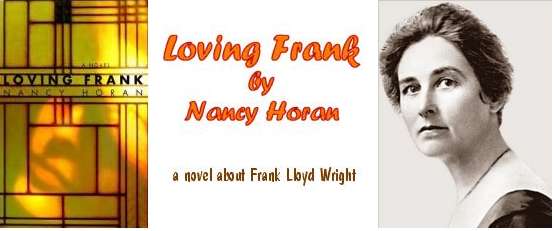
Before the publication of Loving Frank in 2007, few details were known about the love affair between Martha (nicknamed Mamah) Borthwick Cheney and the legendary architect Frank Lloyd Wright. The two met in 1903 when Mamah and Edwin H. Cheney commissioned Wright to design a new home for them. The strong attraction between Mamah and her Frank led to a very publicly conducted affair that scandalized Oak Park, Illinois. Shunned by society, haunted by the press, the lovers decamped to Paris in 1909, leaving behind their spouses and children. They lived abroad for a year. Scholars have relegated Mamah to a footnote in the long, tumultuous life of America's greatest architect.
Loving Frank is based on years of solid research that has unearthed letters, diary entries, and newspaper headlines. With remarkable restraint and great sensitivity, Nancy Horan has blended the known facts with novelistic imagination to create a compelling narrative of a dramatic, ultimately tragic love story. Rich in period detail, the story is told in Mamah's voice and vividly portrays the conflicts of a woman struggling to reconcile the roles of wife, mother, lover, and intellectual one hundred years ago.
Please join us for the May discussion. ~ Ann & Traude |
Questions to Consider ~Part Three
1. Do you think that Edwin Cheney's agreeing to a divorce was admirable under the circumstances;
and were the conditions he set for visitations equitable?
2. How did Mamah take the children's initial shyness when Edwin brought them to the camp in Canada?
3. How could Mamah not have been embarrassed by the crude words of the workers outside the house the morning after her arrival (even though they didn't know she was there with Frank)?
What did it cost her emotionally to realize that the people in Spring Green rejected their lifestyle and despised her?
4. Is it possible that Mamah did not foresee that the scandal might erupt again once the press discovered them together? But even if she had, would she have made a different choice?
5. Was Frank effective in dealing face to face with the members of the paper when they came up to the house? Did anything change?
6. After the break with Ellen Key, who had reprimanded her for leaving the children, without even a moderate income of her own, what or whom could Mamah count on?
Did she have reason to feel betrayed when Ellen Key preferred the translation by Mr. Heubsch (variously printed as Huebsch) ? Is fate closing in ?
Mrs.Sherlock, of course ! Edwin and Catherine would have been a perfect match -- if they had loved each other! Thank you for your input.
Edwin loved Mamah (I too stumble every time I type the nme!), and Catherine loved Frank Wright.
He and Catherine met at a dance in Chicago when she was 16 and they fell head over heels in love. But Anna Wright, fiercely possessive, had moved house with Frank's sisters and came to Chicago as well. From then ones she always lived close to him, except for the year he spent in Europe.
What he accomplished is astonishing, given the fact that he didn't have much of an education. He had been a farmhand for his uncle for several summers; in his senior year dropped out of high school. He attended the University of Wisconsin for one year, and that was it. In 1889 He went to Chicago, disregarding his mother's protests. Eagle-eyed Anna took it upon herself to warn Catherine's parents who packed her off some place for some time. It was no use. Two years later they were married. Anna made Catherine's life hellish.
For her he built the house in Oak Park to which he added and made changes for years. Catherine was as devoted to him as Edwin was to Mamah. I believe both Catherine and Edwin behaved with great dignity. One has to feel sorry for both. Not to give Frank the divorce was Catherine's only weapon. As the years went by she may have realized that if she were to give him a divorce, he would cut off alimony and support for the children. Doubtless it was also revenge. And Mamah's lofty ideas that all would be well in the end, everybody would sit around the table conversing in harmony, was totally unrealistic.
To the questions.
1. The relationship between the lovers was not always smooth and became rockier as Mamah discovered the mounting debt and found out that the "little people", suppliers, draftsmen and handy men, had not been paid.
He charmed his creditors.
2. I believe Frank was less concerned with Mamah's anguish over the attacks by the press than his own anger.
The irony is, of course, that Taliesin did not bring them peace, quite the contrary. They were hounded even by the people in Spring Green. When Frank brought her back from Berlin he just planted her in the unfinished house ostensibly to cook for the 36 (!) men who were building Taliesin without introducing her in any way (!!). But her true identity came out soon enough.
3. I can't think of an answer to this question because I can't imagine myself in Mamah's situation.
5. Yes, I felt pity for Edwin.
6. Mamah was deeply affected by Mattie's death. And she lost Lizzie's admiration and affection !
7. I do not believe Mamah had an alcohol or drug problem.
Here is what Ken Burns said about FLW:
"At some point, you have to forgive Frank Lloyd Wright for his excesses, his ego, his sensitivities, his horrible relations with his kids, and realize, on balance, that here was an extraordinary contribution to human history."
The prairie house style was his invention and - to his anger - it was widely imitated. It as his concept of an "organic" house that harmoniously fits into and becomes part of the landscape, and is characterized by broad horizontal lines, a low roof, and an open interior.
When we had the discussion of FL, we lingered over a thick library tome, borrowed from the library, of his major
works. And we would have liked to stay much longer.
